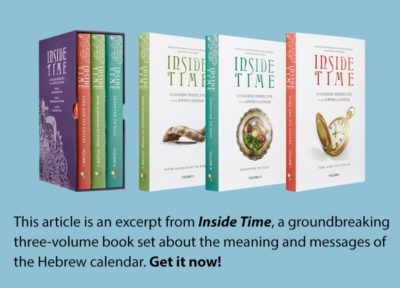The Midrash recounts the following dialogue on the significance of sin:
Wisdom was asked: What is the fate of the transgressor? Wisdom replied: “Evil pursues iniquity” (Proverbs 13:21).
Prophecy was asked: What is the fate of the transgressor? Prophecy replied: “The soul that sins, it shall die” (Ezekiel 18:20).
The Torah was asked: What is the fate of the transgressor? Torah replied: He shall bring a guilt-offering, and it shall atone for him (Leviticus, ch. 5).
G-d was asked: What is the fate of the transgressor? G-d replied: He shall do teshuvah, and it shall atone for him. [1]
The Philosophical Perspective
The concept of “reward and punishment” is one of the fundamental principles of Jewish faith.[2] But punishment for wrongdoing, say our sages, is no more G-d’s “revenge” than falling to the ground is divine retribution for jumping out the window. Just as the Creator established certain laws of cause and effect that define the natural behavior of the physical universe, so, too, did He establish a spiritual-moral “nature,” by which doing good results in a good and fulfilling life and doing evil results in negative and strifeful experiences.[3]
ground is divine retribution for jumping out the window. Just as the Creator established certain laws of cause and effect that define the natural behavior of the physical universe, so, too, did He establish a spiritual-moral “nature,” by which doing good results in a good and fulfilling life and doing evil results in negative and strifeful experiences.[3]
This is the philosophical perspective on sin and punishment, expressed by King Solomon in the above-quoted verse from Proverbs. “Evil pursues iniquity”—the adverse effects of sin are the natural consequences of acts that run contrary to the Creator’s design for life.
The Prophet’s View
Prophecy, which is G-d’s endowment of man with the capacity to cleave to and commune with Him,[4] has a deeper insight into the significance of sin.
The essence of life is connection with G-d. “And you who cleave to G-d,” says Moses to the people of Israel, “are all alive today.”[5] “Love the L-rd your G-d,” he also enjoins them, “for He is your life.”[6]
So a transgression is more than a spiritually “unhealthy” deed—it is an act of spiritual suicide. In the words of the prophet Ezekiel, “The soul that sins, it shall die,” for to transgress the divine will is to sabotage the lifeline of vitality that connects the soul to its source. Our sages echo the prophet’s perspective on sin when they state:
“The wicked, even in their lifetimes, are considered dead…. The righteous, even in death, are considered alive.” [7]
The Guilt-Offering
The Torah has yet a more penetrating view on the nature of transgression. It, too, recognizes that the essence of a person’s life is his relationship with G-d. But the Torah also perceives the superficiality of evil—the fact that:
“A person does not sin unless a spirit of insanity enters into him.” [8]
The soul of man, which is “literally a part of G-d above,”[9]:
“Neither desires, nor is able, to separate itself from G-d.” [10]
It is only a person’s animal self—the material and selfish drives which overlay his G-dly soul—which might, at times, take control of his life and compel him to act in a manner that is completely at odds with his true self and will.[11]
Because the Torah perceives the superficiality of sin, it can guide the transgressor through a process by which he can undo the negative effects of his transgression—a process by which the transgressor recognizes the folly and self-destructiveness of his deed and reinstates his true, G-dly self as the sovereign of his life. This process culminates with the transgressor’s bringing of a korban (animal sacrifice) as an offering to G-d, signifying his subjugation of his own animal self to the spark of G-dliness within him.[12]
In this way, the “guilt-offering” achieves atonement for sin. Only the most external self was involved in the transgression in the first place; by renouncing the deed as “animal behavior” and subjugating the beast within to serve the soul’s G-dly aims, the transgressor restores the integrity of his relationship with G-d.
The Fourth Perspective
There is one thing, however, that the philosophical, prophetic and Torah perspectives on sin have in common: the transgression was, and remains, a negative occurrence.
“Wisdom” sees it as the harbinger of misfortune in a person’s life. “Prophecy” sees it as antithetical to life itself. Torah delves deeper yet, revealing the root cause of sin and providing the key to the transgressor’s rehabilitation; but even after the atonement prescribed by the Torah, the transgression itself remains a negative event. Torah itself defines certain deeds as contrary to the divine will; so nothing in Torah can change the fact that a transgression constitutes a betrayal of the relationship between G-d and man.
G-d, as the author of wisdom, the bestower of prophecy and the commander of Torah, is the source of all three perspectives. But He also harbors a fourth vision of sin, a vision that transcends the three venues of relationship with man which He established, a vision that is His alone: sin as the potential for teshuvah.
The Forbidden Realm
What is teshuvah? To understand the fourth, supra-Torah dimension of sin, we must first take a closer look at the significance of sin according to Torah.
The commandments of the Torah categorize the universe into two domains: the permissible and the forbidden. Beef is permissible, pork is forbidden; the trait of compassion is to be cultivated, and that of haughtiness is to be eliminated; and so on.
Chassidic teaching explains that this is more than a list of do’s and don’ts—it is also a catalog of realizable and unrealizable potentials.
Every created entity possesses a “spark” of divine energy that constitutes its essence and soul. When a person utilizes something—be it a physical object or force, a trait or feeling, or a cultural phenomenon—toward a G-dly end, he brings to light the divine spark at its core, manifesting and realizing the purpose for which it was created.
While no existence is devoid of such a spark—indeed, nothing can exist without the pinpoint of divinity that imbues it with being and purpose—not every spark can be actualized through man’s constructive use of the thing in which it is invested. There are certain “impregnable” elements—elements with which the Torah has forbidden our involvement, so that the sparks they contain are inaccessible to us.
For example: when a person eats a piece of kosher meat and then uses the energy gained from it to perform a mitzvah, he thereby “elevates” the spark of divinity that is the essence of the meat, freeing it of its mundane incarnation and raising it to a state of fulfilled spirituality. However, if he would do the same with a piece of non-kosher meat—meat that G-d has forbidden us to consume—no such elevation would take place. Even if he applied the energy to positive and G-dly ends, this would not constitute a realization of the divine purpose in the meat’s creation, since the consumption of the meat was an express violation of the divine will.
This is the deeper significance of the Hebrew terms assur and mutar employed by Halachah (Torah law) for the forbidden and the permissible. Assur, commonly translated as “forbidden,” literally means “bound”; this is the halachic term for those elements whose sparks the Torah has deemed bound and imprisoned in a shell of negativity and proscription. Mutar (“permitted”), which literally means “unbound,” is the halachic term for those sparks which the Torah has empowered us to extricate from their mundane embodiment and actively involve in our positive endeavors.
Obviously, the “bound” elements of creation also have a role in the realization of the divine purpose outlined by the Torah. But theirs is a “negative” role—they exist so that we should achieve a conquest of self by resisting them. There is no Torah-authorized way in which they can actively be involved in our development of creation—no way in which they may themselves become part of the “dwelling for G-d”[13] that we are charged to make of our world. Of these elements it is said:
“Their breaking is their rectification.”[14]
They exist to be rejected and defeated, and it is in their defeat and exclusion from our lives that their raison d’etre is realized.
The Man in the Desert
These are the rules that govern our existence and our service of G-d. One who lives by these rules, establishing them as the supreme authority over his behavior, attains the status of tzaddik (“perfectly righteous”). Yet our sages tell us that there is an even higher level of closeness to G-d—that:
“In the place where baalei teshuvah (“returnees”; penitents) stand, utter tzaddikim cannot stand.” [15]
The tzaddik is one who has made the divine will the very substance of his existence. Everything that becomes part of his life—the food he eats, the clothes he wears, the ideas and experiences he garners from his surroundings—are elevated, their “sparks” divested of their mundanity and raised to their divine function. And he confines himself to the permissible elements of creation, never digressing from the boundaries that Torah sets for our involvement with and development of G-d’s world.
The baal teshuvah, on the other hand, is one who has digressed; one who has ventured beyond the realm of the permissible and has absorbed the irredeemppable elements of creation into his life. His digression was a wholly negative thing;[16] but having occurred, it holds a unique potential: the potential for teshuvah, “return.”
Teshuvah is fueled by the utter dejection experienced by one who wakes to the realization that he has destroyed all that is beautiful and sacred in his life; by the pain of one who has cut himself off from his source of life and well-being; by the alienation felt by one who finds himself without cause or reason to live. Teshuvah is man’s amazing ability to translate these feelings of worthlessness, alienation and pain into the drive for rediscovery and renewal.
The baal teshuvah is a person lost in the desert whose thirst, amplified a thousandfold by the barrenness and aridity of his surroundings, drives him to seek water with an intensity that could never have been called forth by the most proficient welldigger; a person whose very abandonment of G-d drives him to seek Him with a passion the most saintly tzaddik cannot know. A soul who, having stretched the cord that binds it to its source to excruciating tautness, rebounds with a force that exceeds anything experienced by those who never leave the divine orbit.
In this way, the baal teshuvah accomplishes what the most perfect tzaddik cannot: he liberates those sparks of divinity imprisoned in the realm of the forbidden. In his soul, the very negativity of these elements, their very contrariness to the divine will, becomes a positive force, an intensifier of his bond with G-d and his drive to do good.[17]
This is teshuvah, “return,” in its ultimate sense: the reclaiming of the “lost” moments (or days, or years) and energies of a negative past; the restoration of sparks imprisoned in the lowliest realms of creation; the magnified force of a rebounding soul.
Good and Evil
But what of the “bindings” that imprison these sparks? If the tzaddik were to employ a forbidden thing toward a positive end, he would fail to elevate it; indeed, the deed would drag him down, distancing him from, rather than bringing him closer to, the G-d he is presuming to serve. From where derives the baal teshuvah’s power to redeem what the Torah has decreed “bound” and irredeemable?
In its commentary on the opening verses of Genesis, the Midrash states:
At the onset of the world’s creation, G-d beheld the deeds of the righteous and the deeds of the wicked…. But I still do not know which of them He desires…. Then, when it says, “And G-d saw the light, that it is good,”[18] I know that He desires the deeds of the righteous, and does not desire the deeds of the wicked. [19]
In other words, the only true definition of “good” or “evil” is that “good” is what G-d desires and “evil” is what is contrary to His will. The fact that we instinctively sense certain deeds to be good and others to be evil—the fact that certain deeds are good and certain deeds are evil—is the result of G-d having chosen to desire certain deeds from man and to not desire other deeds from man. We cannot, however, speak of good and evil “before” G-d expressly chose the “deeds of the righteous.” On this level, where there is nothing to distinguish right from wrong, we cannot presume to know what G-d will desire.
Therein lies the difference between the tzaddik and the baal teshuvah.
The tzaddik relates to G-d through his fulfillment of the divine will expressed in the Torah. Thus, his achievements are defined and regulated by the divine will. When he does what G-d has commanded to be done, he elevates those elements of creation touched by his deeds. But those elements with which the divine will forbids his involvement are closed to him.
The baal teshuvah, however, relates to G-d Himself, the formulator and professor of this will. Thus, he accesses a divine potential that, by Torah’s standards, is inaccessible. Because his relationship with G-d is on a level that precedes and supersedes the divine will—a level on which one “still does not know which of them He desires”—there are no “bound” elements, nothing to inhibit the actualization of the divine potential in any of G-d’s creations. So when the baal teshuvah sublimates his negative deeds and experiences to fuel his yearning and passion for good, he brings to light the sparks of G-dliness they hold.
To Be and To Be Not
What enables the baal teshuvah to connect to G-d in such a way? The tzaddik’s ability to relate to G-d through the fulfillment of His will was granted to each and every one of us when G-d gave us the Torah at Mount Sinai. But what empowers the baal teshuvah to reach the “place where utter tzaddikim cannot stand” and tap the “pre-will” essence of G-d?
The thrust of the baal teshuvah’s life is the very opposite of the tzaddik’s. The tzaddik is good, and the gist of everything he does is to amplify that goodness. The baal teshuvah has departed from the path of good, and the gist of everything he does is to deconstruct and transform what he was. In other words, the tzaddik is occupied with the development of self, and the baal teshuvah, with the negation of self.
Thus the tzaddik’s virtue is also what limits him. True, his development of self is a wholly positive and G-dly endeavor—he is developing the self that G-d wants him to develop, and by developing this self he becomes one with the will of G-d. But a sense of self is also the greatest handicap to relating to the essence of G-d, which tolerates no camouflaging or equivocation of the truth that “there is none else besides Him.”[20]
The baal teshuvah, on the other hand, is one whose every thought and endeavor is driven by the recognition that he must depart from what he is in order to come close to G-d. This perpetual abnegation of self allows him to relate to G-d as G-d is, on a level that transcends G-d’s specific projection of Himself formulated in His Torah.
This is G-d’s perspective on sin: sin as the facilitator of teshuvah. “Wisdom,” “prophecy” and “Torah” are all part of a reality polarized by good and evil; they can perceive only the damage inflicted by sin, or, at most (as in the case of Torah), the manner by which this damage might be undone. G-d’s reality, however, is wholly and exclusively good. “No evil resides with You,” sings the Psalmist.[21] In the words of Jeremiah:
“From the Supernal do not stem both evil and good.”[22]
From G-d’s perspective, there is only the positive essence of transgression—the positive purpose for which He created man’s susceptibility to evil and his capacity for sin in the first place. As viewed by its Creator, transgression is the potential for a deeper bond between Himself and man—a bond borne out of the transformation of evil into good and failure into achievement.
Based on the Rebbe’s writings and talks, including a letter dated 8 Tishrei, 5712 (October 8, 1951) and an address delivered on 9 Adar II, 5725 (March 13, 1965)[23]
[1]. Yalkut Shimoni on Psalms 25.
[2]. The 11th of Maimonides’ “Thirteen Principles.”
[3]. Shaloh, Bayit Acharon 12a. See also Shaar HaTeshuvah, part I, 6c and 50b; Likkutei Biurim on Tanya, vol. II, p. 129.
[4]. See ch. 7 of Maimonides’ “Eight Chapters” of introduction to his commentary on Ethics of the Fathers.
[5]. Deuteronomy 4:4.
[6]. Ibid. 30:20.
[7]. Talmud, Berachot 18a-b.
[8]. Ibid., Sotah 3a, based on Numbers 5:12.
[9]. Tanya, ch. 2, after Job 31:2.
[10]. Rabbi Schneur Zalman of Liadi.
[11]. See Crime and Punishment, WIR, vol. X, no. 47.
[12]. See Talmud, Sotah 14a; Likkutei Torah, Vayikra 2b-d.
[13]. Midrash Tanchuma, Nasso 16; Tanya, ch. 36.
[14]. Paraphrase of Sifra, Shemini 7; see Sefer HaMaamarim 5654, p. 76.
[15]. Talmud, Berachot 34b.
[16]. Indeed, the Talmud (Yoma 85b) warns that one who says, “I shall sin and then repent” is “not given the opportunity to repent.”
[17]. Tanya, ch. 7.
[18]. Genesis 1:4.
[19]. Midrash Rabbah, Bereishit 2:7.
[20]. Deuteronomy 4:35.
[21]. Psalms 5:5.
[22]. Lamentations 3:38.
[23]. Igrot Kodesh, vol. V, p. 3; Likkutei Sichot, vol. VII, pp. 22-23
This article is an excerpt from Inside Time, a groundbreaking three-volume book set about the meaning and messages of the Hebrew calendar.








baal teshuvah – thats me. it is describing exactly what has happened to me in the last 5 months. a quantum leap in spiritual development after being dead for so long.
suddenly being able to talk to people about morality and the experiences in my life and having what i felt were impossible obstacles suddenly begin to work my way. righteousness and truth have done this all. the seeds i have planted coming to fruition so fast – bringing light into dark places – my good deeds – making tears of joy flow from my eyes – something ive never experienced.
– the loss of self – and a new self appearing – i am now a different person – but it was there inside me all along waiting to come out. it was sin & my surroundings getting in the way.
i dont know how to say it – the glow in my chest – its back – something i only glimpsed briefly for 15 seconds once in my life.
i could feel – usually only music which i could relate to – but never love or god – not like this – a spark? more like a fire. i am baffled & it scares me as its so new but i must be doing something right.
thanks for helping me understand. i hope this all doesnt sound nutty – this article just smacked me in the face as it is like a deja vu.
it only took 3 words to make it all come thundering back -i cant say them as i dont mean to offend – but having my children experience racism firsthand from my now ex-common law spouse and seeing the damage it did to them as innocents and the damage to my relationship with them sent my faith flying up from somewhere inside of me. i can only say one thing when i look up at the sky – thank you.
It is quite amazing to me how we need to hit a bottom before we can truly comprehend the necessity to change. Only now can I clearly hear in others the denial, fear, pride and ego that I still work on in my own self!!!
I can’t accept all those levels of obfuscation, it sply does not reflect the environment we have been given. We sin. Guilt? An indulgence. If the task is to submit, the atonement has occurred through Christ. All these levels of obfuscation and kosher meals causing elevated spark is not something you can do without god. God does this. All your asked to do is submit. It looks as though this is a process of control.
You have genesis why would you gain a benefit from another’s commentary especially the midrash? This is why you are terrified of falling ot of gods favor, even though elsewhere in the article it is never from the divine side. Always the flesh. The important work is simple : live his way. Clothing does not become elevated through a series of rituals. Certainly by nothing you could do alone. When u gonna feel safe? He got your back. Wow. Love your enemy already. Thy is what we all are waiting for. Like ever since. Did you know we were waiting? Put simply yes. Yes you are in favor with god. Love your neighbour first, then when your guest is clothes and fed, then go do something else you and god.